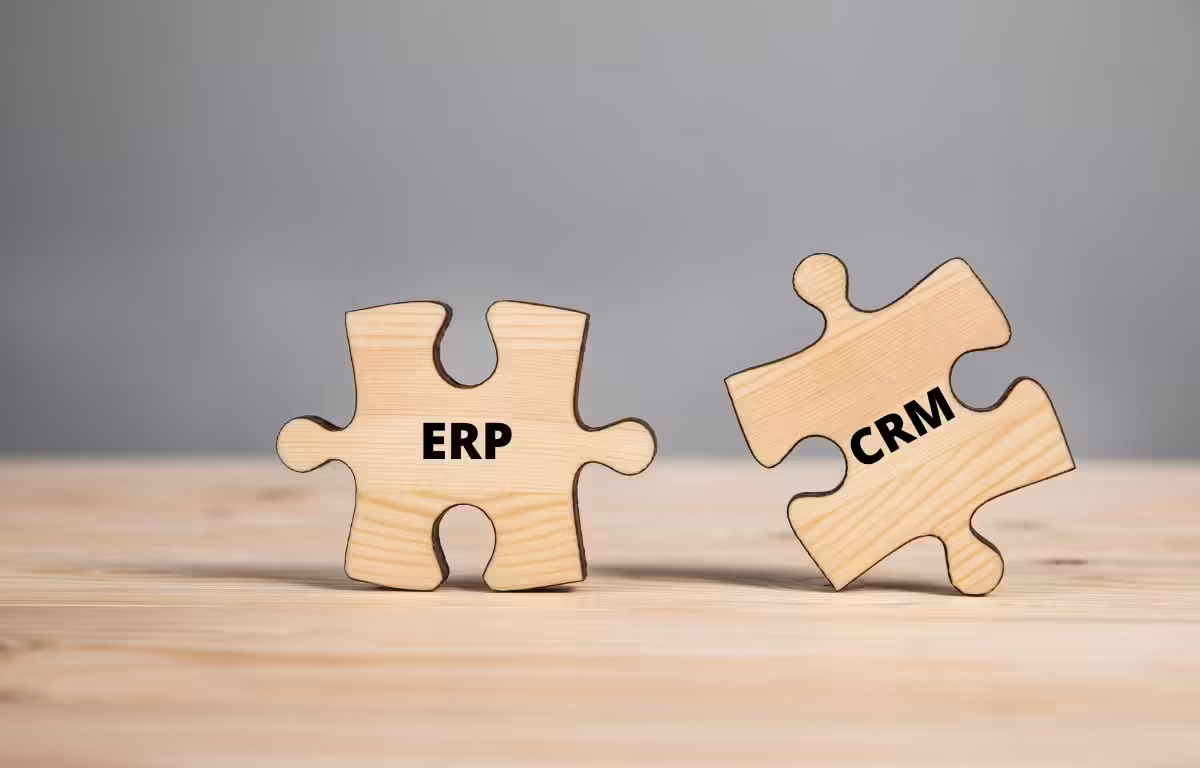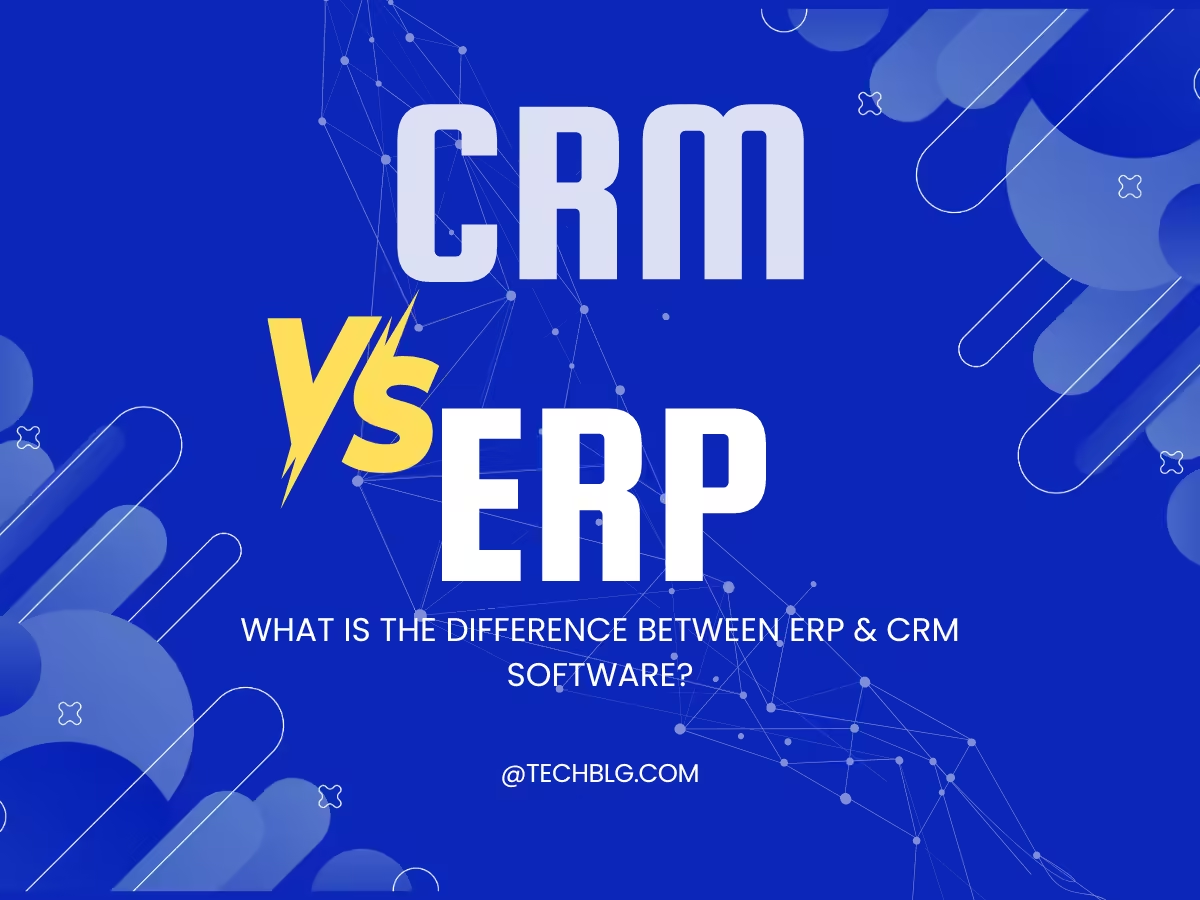What is the Difference between ERP & CRM Software?
Introduction
In the business software world, ERP (Enterprise Resource Planning) and CRM (Customer Relationship Management) are powerful tools that support growth in unique ways. They are often mistaken for one another due to their overlapping functionalities, but each serves distinct purposes. Understanding their differences is essential for choosing the right system to improve business efficiency, manage operations, and foster customer relationships. This article will break down ERP and CRM, exploring their roles, benefits, differences, and which software systems are leading the market in both categories.
If you’re interested in learning more about selecting the right software for your business, check out our articles, Best CRM for Small Business of 2024 and The Importance of Having an ERP for Your Small Business.
Table of Contents – Difference between ERP & CRM Software

Understanding ERP Software
What is ERP?
ERP software integrates a business’s core processes—such as finance, inventory, HR, and supply chain—into a single system. It creates a centralized database that all departments can access, ensuring data consistency, accuracy, and streamlined workflows.
Key Features of ERP Software
- Financial Management – Manages budgeting, financial reporting, and expense tracking.
- Supply Chain Management – Automates inventory, orders, and supply chain logistics.
- Human Resources – Handles payroll, employee records, and performance management.
- Manufacturing & Production – Plans production, manages materials, and forecasts demand.
- Inventory Control – Tracks stock levels and optimizes order fulfillment processes.
Benefits of ERP
ERP offers several advantages:
- Operational Efficiency: Automates repetitive tasks, freeing up employees for more strategic work.
- Informed Decision-Making: A single data source provides managers with reliable information for making critical business decisions.
- Enhanced Collaboration: Cross-departmental visibility supports teamwork and coordinated efforts.
Understanding CRM Software
What is CRM?
CRM software is focused on managing customer relationships, improving sales, and enhancing customer satisfaction. CRM organizes customer information, tracks interactions, and supports sales and marketing efforts.
Key Features of CRM Software
- Contact Management – Stores customer data for easy access and management.
- Sales Pipeline Tracking – Organizes sales processes, helping teams prioritize and close leads.
- Marketing Automation – Facilitates marketing campaigns, email outreach, and customer segmentation.
- Customer Service – Tracks service requests, ensures timely support, and manages client interactions.
- Analytics & Reporting – Provides insights on customer behavior, sales trends, and marketing effectiveness.
Benefits of CRM
CRM systems bring valuable benefits, such as:
- Enhanced Customer Satisfaction: Helps deliver personalized service and support by giving teams a comprehensive view of customer data.
- Streamlined Sales Processes: CRM tools allow sales teams to track leads, manage customer interactions, and increase conversion rates.
- More Effective Marketing: CRM systems help businesses understand customer preferences, enabling better-targeted marketing campaigns.
ERP vs. CRM: Core Differences
While both ERP and CRM aim to streamline business processes, they focus on different areas and users.
| Feature | ERP Software | CRM Software |
|---|---|---|
| Primary Function | Integrates core business processes | Manages customer relationships |
| Main Users | Operations, HR, finance, supply chain | Sales, marketing, customer support |
| Scope | Broad; covers entire business | Narrower; focused on customer data |
| Data Focus | Internal operational data | Customer-centric and sales data |
| Implementation Cost | Higher due to integration needs | Typically lower |
Top ERP & CRM Software Options
Here are some of the best ERP and CRM solutions available for businesses today, along with descriptions, features, pricing, and a quick look at their pros and cons.
1. SAP ERP
Description: SAP ERP is one of the most widely used ERP solutions, known for its flexibility and extensive functionality. It’s ideal for larger enterprises that need a robust and scalable solution.
- Key Features: Financial management, asset management, procurement, inventory control, and HR.
- Pricing: Customized quotes based on company needs.
| Pros | Cons |
|---|---|
| Highly customizable | High cost |
| Excellent scalability for growth | Complex implementation |
2. Oracle NetSuite (ERP)
Description: Oracle NetSuite is a cloud-based ERP solution suitable for small to medium-sized businesses looking for scalability as they grow.
- Key Features: Order processing, financial management, inventory tracking, and in-depth analytics.
- Pricing: Starts around $99 per user per month with customized options.
| Pros | Cons |
|---|---|
| Cloud-based, flexible | Higher initial investment |
| Strong reporting capabilities | Customization can be complex |
3. Salesforce (CRM)
Description: Salesforce is the world’s leading CRM, offering a vast ecosystem of tools to manage customer relationships effectively. It is widely used by sales, marketing, and support teams worldwide.
- Key Features: Contact management, sales tracking, marketing automation, and customer service tools.
- Pricing: Starts at $25 per user per month.
| Pros | Cons |
|---|---|
| Customizable with extensive apps | Learning curve for new users |
| Highly scalable and flexible | Can be costly |
4. Zoho CRM
Description: Zoho CRM offers an affordable solution for small to medium-sized businesses that want robust CRM capabilities without the high price tag.
- Key Features: Lead tracking, pipeline management, marketing automation, and analytics.
- Pricing: Starts at $12 per user per month.
| Pros | Cons |
|---|---|
| Cost-effective and user-friendly | Limited customization |
| Great for small businesses | Moderate scalability |
5. Microsoft Dynamics 365 (ERP & CRM)
Description: Microsoft Dynamics 365 combines ERP and CRM capabilities, making it a strong choice for businesses that want an all-in-one solution. It’s particularly beneficial for companies using other Microsoft products.
- Key Features: Sales, customer service, financial management, supply chain, and field service management.
- Pricing: Starts at $50 per user per month.
| Pros | Cons |
|---|---|
| Integrates well with Microsoft | Customization costs can be high |
| Versatile for businesses of all sizes | Complexity in initial setup |
Integrating ERP and CRM for Maximum Efficiency
While ERP and CRM are separate systems, integrating them can unlock even greater efficiencies. With integration, businesses can sync sales data with inventory levels, improving customer satisfaction while maintaining stock control. An integrated ERP-CRM system ensures that each department has real-time access to critical information, from customer orders to production schedules.
Frequently Asked Questions
- What is the primary difference between ERP and CRM?
ERP focuses on internal process management, while CRM centers on customer relationship management and sales tracking. - Can ERP and CRM work together?
Yes, ERP and CRM can integrate, allowing for better coordination between sales and operations. - What types of businesses use ERP software?
ERP is commonly used by manufacturing, retail, and distribution businesses but is suitable for any industry with complex operations. - Is ERP more expensive than CRM?
Generally, ERP systems are more expensive due to their broader functionality and complex implementation. - What is the best CRM software for small businesses?
Salesforce, Zoho CRM, and HubSpot are popular CRM solutions for small businesses.
Conclusion
ERP and CRM systems both bring unique value to businesses but serve different purposes. ERP focuses on internal operations, ensuring smooth, efficient workflows, while CRM targets customer interactions and sales management. Choosing between ERP and CRM—or using both together—depends on a business’s size, budget, and goals. Small businesses looking to improve customer relationships might start with a CRM, while larger organizations needing to streamline operations may prioritize an ERP.
If you’re exploring CRM options for small businesses, check out our article Best CRM for Small Business of 2024, or read about The Importance of Having an ERP for Your Small Business to learn more about the potential benefits of ERP software.

Leave a Reply